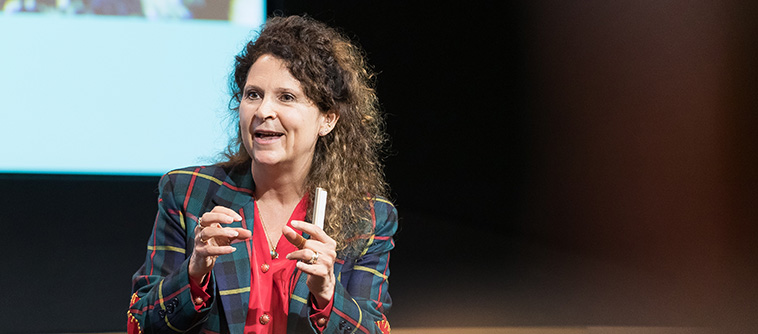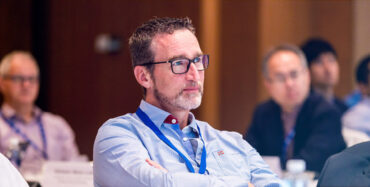
Eat less, move more. The two things we all know a person needs to do to lose weight. So why is the diet industry estimated to be worth, as of 2018, almost $215 billion?
Because individuals, companies and wider society share a similar struggle: turning what they know into what they do.
This was the message shared by Susan Goldsworthy, Affiliate Professor of Leadership and Organizational Change at IMD, in a session on day two of the Annual International Alumni Event 2019.
Coping with change
Humans have three strategies when coping with change, says Goldsworthy: “denial, distraction and despair.” Despair is becoming more common amongst climate scientists, Goldsworthy said, as they live daily with the truth about what is happening with our planet. But for many of us, caught up in our day-to-day lives, distraction is the one we do most.
This is the challenge of change – doing it ourselves is difficult. We often know that we have to change, but we find it difficult to let go and daily habits.
But there is a fourth way to cope with change – to engage in dialogue, to converse with each other to raise awareness and give each other hope that something can be achieved.
It’s important to remember that change is a process, Goldsworthy added, and you can’t just skip ahead to new conditions – we have to transition.
Change also has to be a conscious choice, and we need to step out of our comfort zones to do it, a topic covered in her award-winning books, Choosing Change (co-authored with Walter McFarland) and Care to Dare (co-authored with George Kohlrieser and Duncan Coombe).
On personal responsibility, Goldsworthy echoed the words of IMD President, Professor Jean-François Manzoni in his opening remarks on day one of the alumni event. We face so many challenges, and for our own health and for the sake of the planet, we can no longer separate our professional and personal personas.
Each of us should think about what we can do to improve the world. We may not be able to contribute to all the SDGs, for example, but we can pick two or three and decide how we can take action.
Wrapping up her speech, Goldsworthy highlighted how many of us get our inspiration from our children or grandchildren. This led her to write, with her daughter Sydney Goldsworthy, Where the Wild Things Were, an illustrated book for children and adults that seeks to educate and entertain and show how, working together, we can step up to our responsibility to protect what we still can while we still can.
Finding hope through dialogue
We have reached a tipping point where corporations need to do something about sustainability, said Nadine Hack, CEO of beCause Global Consulting.
Sharing a personal story on the importance of dialogue, Hack recounted how, in the 1970s, she worked with four groups who were, at the time, the worst of enemies; environmental activists, logging companies, community organisers and government.
Hack says she experienced an ‘a-ha moment’. It may be cathartic for the activists to chain themselves to trees, she said, but ultimately this will have no impact. The groups had to sit down together and enter into a wary coalition. After intensive dialogue, they emerged with a solution that is still in place today.
The lesson? No one sector has the knowledge and capacity to solve the major challenges the world is facing. It’s critical to work together.
In today’s divisive world, we need this constructive dialogue more than ever, and Hack listed four factors for effective collaboration and dialogue.
Firstly, everyone involved in a collaboration must be honest and clear about what they are willing to put in, and what they want to take out.
Secondly, you must encourage people to go beyond their own territorial positions and see the bigger picture.
Thirdly, offer ongoing nurturing. Engagement doesn’t stop after an initial meeting: you must stay in touch with the people you work with, learn from each other, and recreate these bonds over and over.
Finally, we must reveal our own humanity and find humanity in others, Hack said. In our divided world, common ground can be hard to find, but we are all human beings sharing the same concerns; the health and happiness of our families and the safety and prosperity of our communities.
Closing the session, Goldsworthy acknowledged how, in today’s world, it can be difficult to maintain hope. However, it is through dialogue and connecting to each others humanity That hope can flourish.
This hope is contagious, and if we nurture and propagate it, together, we can make a difference in this magical, more-than-human world.


